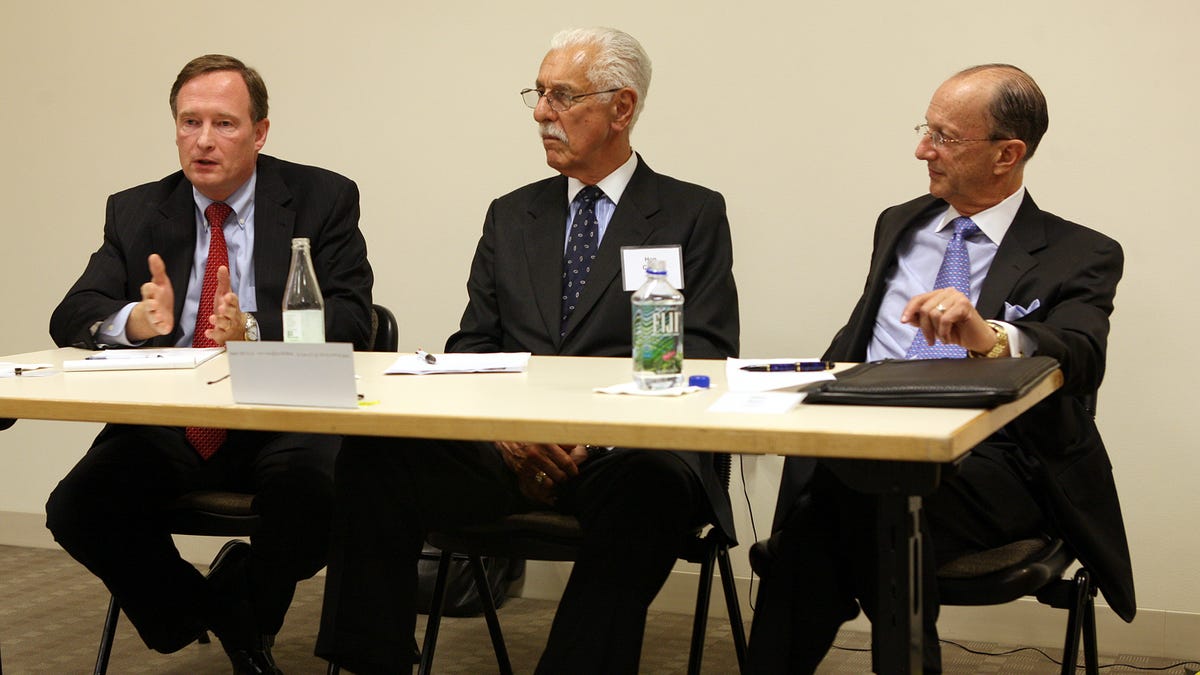What an anti-Google antitrust case by the FTC may look like
Washington, D.C., lawyer paid by Google's competitors says carving the Mountain View search company into multiple parts isn't "necessarily what's called for here," but might end up happening.

SAN FRANCISCO -- It's not certain that Google will face a federal antitrust lawsuit by year's end. But if that happens, it seems likely to follow an outline sketched by Thomas Barnett, a Washington, D.C., lawyer on the payroll of Google's competitors.
Barnett laid out his arguments during a presentation here last night: Google is unfairly prioritizing its own services such as flight search over those offered by rivals such as Expedia, and it's unfairly incorporating reviews from sites like Yelp without asking for permission.
"They systematically reinforce their dominance in search and search advertising," Barnett said during a debate on search engines and antitrust organized by the Federalist Society. "Google's case ought to have been brought a year or two ago."
Expedia and Microsoft are part of Barnett's so-called FairSearch.org coalition, which is lobbying against Google with the help of a former Microsoft lobbyist. Other FairSearch members include Google rivals Oracle, Nokia, and Hotwire. Yelp has not joined FairSearch, but CEO Jeremy Stoppelman has expressed similar concerns (PDF).
The Democratic chairman of the Federal Trade Commission, Jon Leibowitz, took the unusual step of announcing a formal investigation into Google's "search and search advertising" practices last month. Leibowitz predicted it would conclude by the end of 2012 -- weeks before his term would end if Mitt Romney happens to be elected.
Barnett said that if the FTC sues and wins, services like Google Flight Search should no longer be automatically placed near the top of the results. "Google would be restricted from displaying results in a way that's misleading or deceptive," he said. "If it's a search result, it goes through their algorithm."
Another option, Barnett said, would be a breakup involving "cutting, severing, certain parts" of the Mountain View, Calif.-based company. "I'm not saying that's necessarily what's called for here -- but be careful," he said. (The Justice Department tried to carve up Microsoft, but an appeals court didn't buy it.)
The FTC can take action against Google, Barnett said, for "failing to disclose to consumers what they were doing -- they deceived consumers into thinking they were clicking on the most relevant search result."
Barnett is currently a partner at the well-heeled Covington and Burling law firm, which enjoyed $583 million in revenue and $1.2 million in average profits per partner in 2009. Covington's lobbying clients include Amazon.com and Microsoft. Previously Barnett was assistant attorney general for antitrust during the Bush administration.
Taking the other side during the Federalist Society debate last night was Ronald Cass, the former dean of the Boston University School of Law and former vice chairman of the U.S. International Trade Commission, who said there is zero evidence that Google violated antitrust law.
Time after time, including in the IBM, Microsoft, and AT&T cases, the Justice Department and the FTC overestimated companies' market dominance and underestimated rivals' ability to compete, Cass said. "Time showed that Microsoft really was not as dominant as it seemed to be -- companies like Google were coming along behind it."
Google is competing in one of those "areas in which entry is free, where the products are priced freely, consumers are charged nothing, companies come and go," he said. "Google is much more vulnerable than a lot of these other dominant firms were."
And the complaints from Expedia and Yelp? Cass says it's another example of competitors trying to hobble a rival by lobbying legislators and regulators. That's a "very dangerous role" for antitrust to be in, he said.
Disclosure: McCullagh is married to a Google employee not involved in the FTC investigation.
Correction: The article incorrectly listed Yelp as a member of FairSearch.org.

